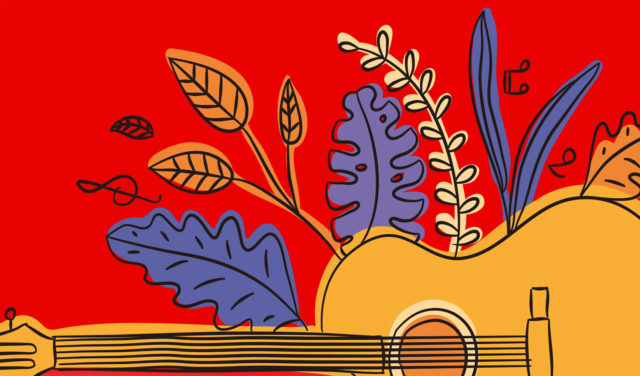
Musicologists may argue about how to define folk music, but let us offer this simple suggestion: Folk music is a feeling more than a sound. Listening to folk music, whether it’s about love or death or sex or politics, feels like coming home after a long day at work. It feels like the first cool rain of spring or the first bitter wind of winter — it’s familiar. It’s part of us, of the seasons of our lives.
The Folks Festival is about tapping into that familiar feeling. It’s about remembering that real people with real stories are at the heart of music. The beauty is that those stories often reflect our own personal narratives of love and loss and joy and despair. Suddenly, we feel less alone. We feel connected. We feel like we’ve come home to a house we didn’t know existed.
For three days each year, Planet Bluegrass Ranch becomes a 5,000-person “summit on the song,” a celebration of the power of songwriting.
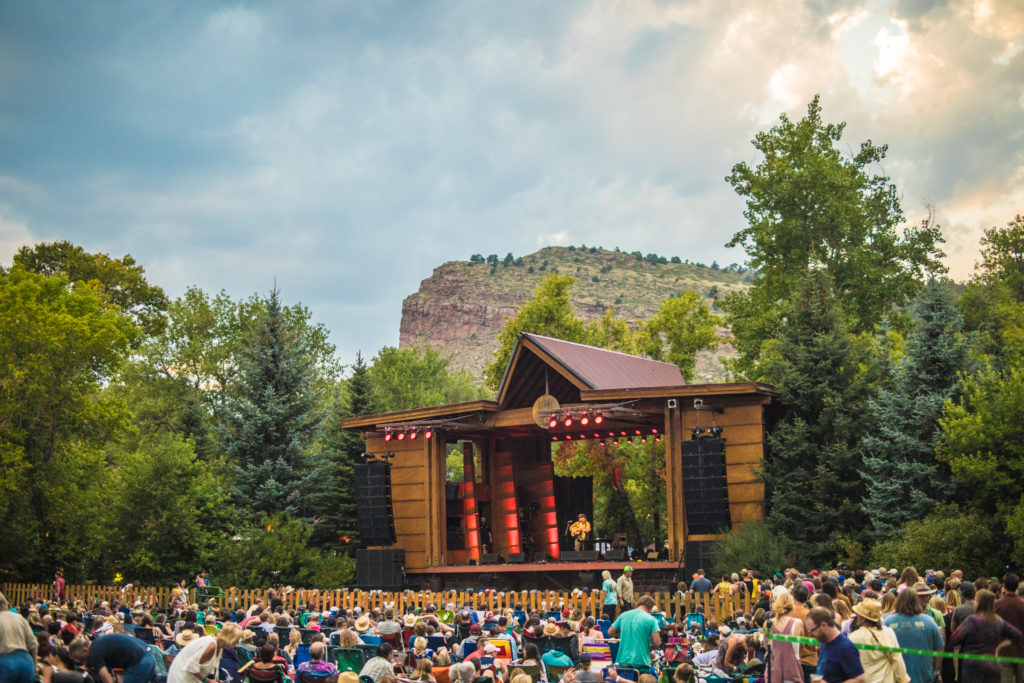
It gives us great joy each year to highlight some of the musical acts that will take the stage at Folks Fest because we truly believe that music, when shared together in an otherworldly setting like Planet Bluegrass, reminds us of what’s right in the world, of how similar we all are.
This year we bring you stories from artists who have graciously — perhaps sometimes painfully — opened up their worlds to us so that we might all feel less alone. From the raw, political musings of Ani DiFranco to the whimsical explorations of Haley Heynderickx to the powerful community-building gospel of Yasye Barnwell, there is as much to be felt as there is to be heard at this year’s Folks Fest.
Listen to Boulder Weekly’s Folks Fest 2019 playlist for a preview of all the good grooves you’ll hear in Lyons: https://open.spotify.com/playlist/3VGBoW4GTJCuITiKd1QUug
ON THE BILL: The 29th Annual Folks Festival. Aug. 16-18, Planet Bluegrass, 500 W. Main St., Lyons. For full schedule visit: bluegrass.com/folks/lineup/main-stage
Laura Cortese and the Dance Cards
by Caitlin Rockett
Going to Berklee College of Music was bittersweet for Laura Cortese. It was the perfect place for this lifelong fiddle player, surrounded by other passionate musicians. But she couldn’t afford it — until after her dad passed away.
“One of the last conversations I had with my dad, he took me to get my trunk, the trunk I was going to take away to college, to UC Santa Cruz,” she says, “And he was like, ‘Why are you going to UC Santa Cruz? You want to be a musician.’ And we had this very clear conversation about who I was and what I wanted to do.”
When she received some inheritance in the wake of her grief, she knew how to honor her dad. Boston opened up Cortese’s musical world in an organic way. It’s not Nashville, and it’s not LA.
“It’s such a rich and very authentic music community where people are really making art that they believe in,” she says. “Boston’s not an industry town. So [people are] there to be part of a community, not there because someone might see them and sign them.”
Cortese went on to perform with Uncle Earl, Band of Horses and Pete Seeger, co-founded the Boston Celtic Music Festival and released several solo albums before forming Laura Cortese and the Dance Cards, a singing string quartet that puts an alternative spin on traditional folk sounds.
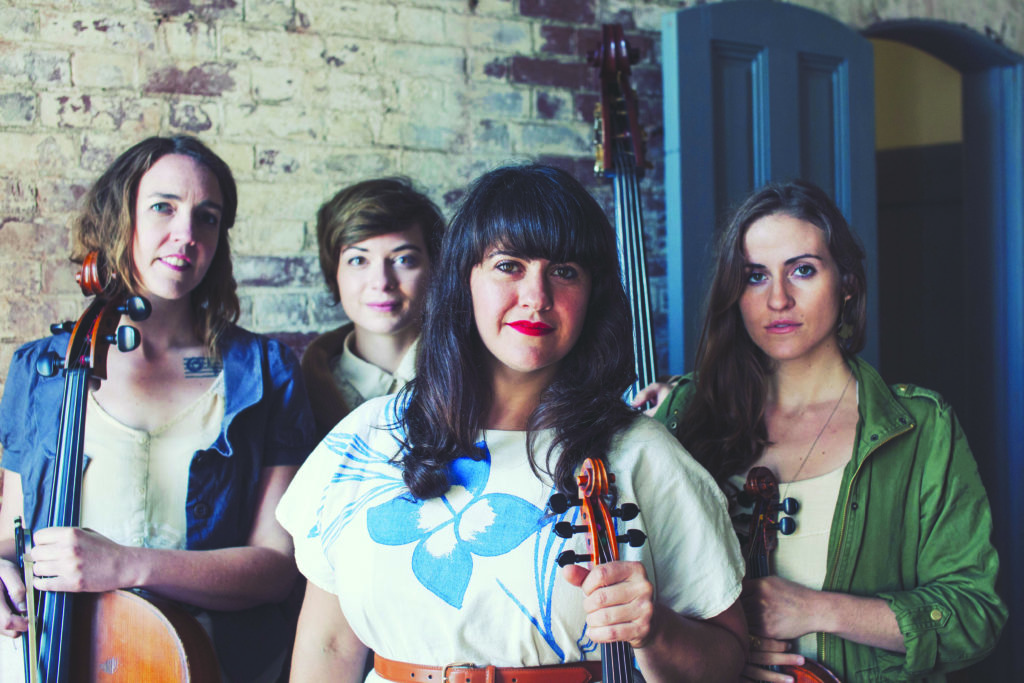
Cortese is progressive in her message, as well, openly discussing her privilege as a cisgender, straight, white woman and the relative protection that provides her in the world. The song “Pace Myself,” off the quartet’s debut album California Calling, is a slinky, bass- and glass harmonica-driven reflection on the way that Cortese — and countless women before and after her — have learned to move through a world that demands they be a little less emotional, take up a little less space. The video features femmes of all types, musicians and regular folks, just being themselves, singing, sometimes dancing.
Mentors, often other women, helped Cortese understand her power, and how to harness it.
“I was consistently told that I felt things a little too strong or expressed them a little too loud and it took a while to be able to reframe those things that were said to me,” she says. “And it isn’t that you need to be quieter or that you need to be less angry, but you need to refine the message so that it is actually making change happen. Being a white, cisgendered, straight woman, I have the upper hand, I have more options than other women in our society. I really do get to walk relatively unscathed through the world and do have a platform. With [the video for ‘Pace Myself,’] I wanted to try to not just tell my own story but see if I could make space for people that were less heard, less noticed or told even worse things.”
Laura Cortese and the Dance Cards, Friday, Aug. 16, 12:45 p.m.
Ani DiFranco
by Caitlin Rockett
Ani DiFranco’s been callin’ it like she sees it for the past 30 years. Honesty is her brand, sharing her modus operandi. Her version of punky folk weaponized raw political stances and even rawer personal experiences like abortion and abuse. Throughout her career, DiFranco has maintained a level of vulnerability that has allowed a generation of women to hear their own experiences reflected back to them in a world that often marginalized them.
So, as a self-proclaimed and seasoned “oversharer,” it came as a bit of a surprise when DiFranco found herself panicked as she sat down to record the audio version of her recently released memoir, No Walls and the Recurring Dream.
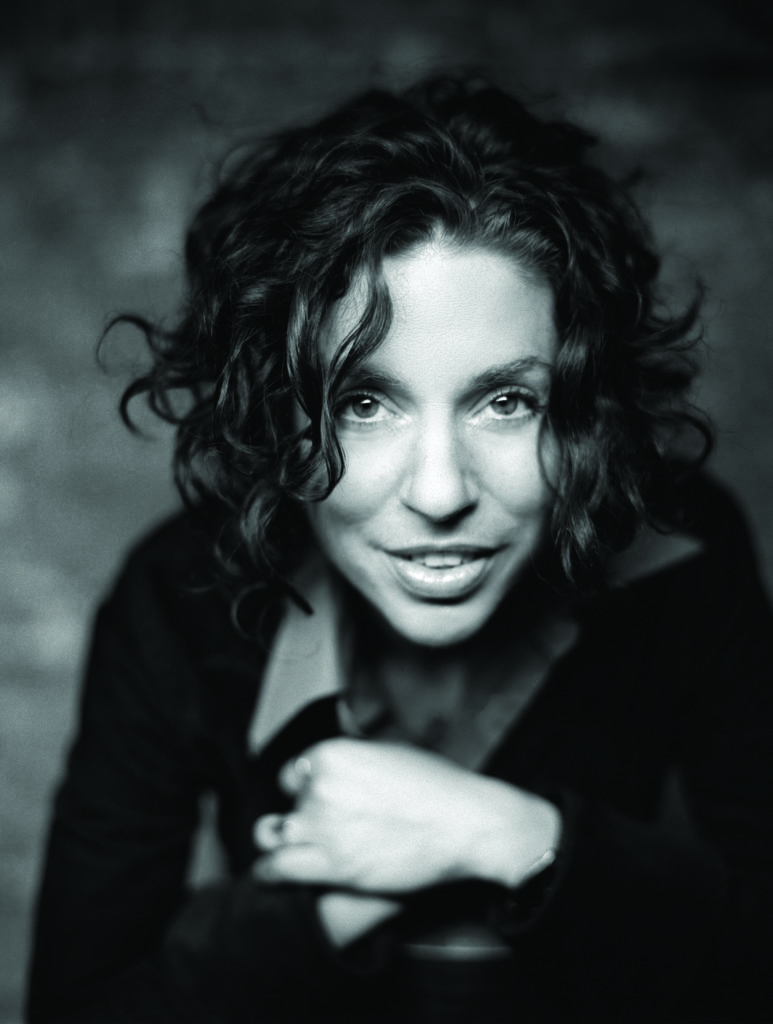
“When I sat down in front of the microphone in the recording studio for four days, 9 to 5, reading this book that I had just written, I felt trapped and super exposed and like I wanted to run,” she admits. “I sort of got through the recording of the audio book, but afterwards I was sort of reeling from the experience and trying to unpack it, and I realized that my writing process involves pretending I’m alone and that there is nobody listening and that there will be no repercussions, that there is no reaction. It’s only me now and I just have to get this out. I guess there was something about pushing even further in this memoir, into the realm of intimacy with strangers — self exposure and shit like that.”
DiFranco has done a lot of looking back lately, not only to produce No Walls and the Recurring Dream, but also to produce the No Walls Mixtape, a collection of 16 stripped-down versions of classic Ani songs.
She’s taken a reprieve from sharing her own story as she worked on The Prison Music Project with singer/songwriter Zoe Boekbinder. The album is a collection of songs, poems and raps by nine currently or previously incarcerated artists at New Folsom Prison (Sacramento State Prison).
“There’s about 15 pieces on it, and you get to the end and you feel like they’re just like me, you know?” DiFranco says. “That’s like me in there and I’ve messed up too. And where would I be without a second chance?”
Profits from album sales will benefit arts in prisons (Boekbinder began the project while doing volunteer programs at the prison) and reentry programs for people being released from prison.
And between all this — memoirs and mixtapes and criminal justice reform advocacy — DiFranco remains a devoted mother to a son and daughter. Motherhood has helped her learn what to say yes to (anytime the kids want to play) and broadened her understanding of what she was put on this Earth to do.
“I’m kind of queen feminist, stomping around the world, you know, that’s much of my mission in this world,” she says. “And I feel like my feminism was deepened in a profound way by the process of being pregnant, of giving birth and then of being a mother. Even my most essential mission was really deeply informed and continues to be.”
Ani DiFranco, Friday, Aug. 16, 9 p.m.
Haley Heynderickx
by Angela K. Evans
As we chat on the phone, the soft-spoken Portland singer-songwriter Haley Heynderickx is sitting in her yard, looking at the chubby, not-yet-reddened tomatoes. And the snap peas, the snap peas she’s particularly proud of.
Recently, “I got to go to my first barbecue and bring snap peas, which felt like an odd victory watching people eat snap peas in front of me,” she says. “All the clichés have come true.”
She pauses to scare off a recently arrived neighborhood tabby cat who is wagging its tail at the bird bath in a threatening way.
“You know how some cats have a look of a murderer in their eyes…” she explains.
Heynderickx hit the indie folk scene in 2018, with her debut LP I Need To Start A Garden, a collection of refreshingly sincere work backed by her intimate classical guitar picking style. The lyrics are both introspective and existential, with a little tongue-in-cheek humor thrown in.
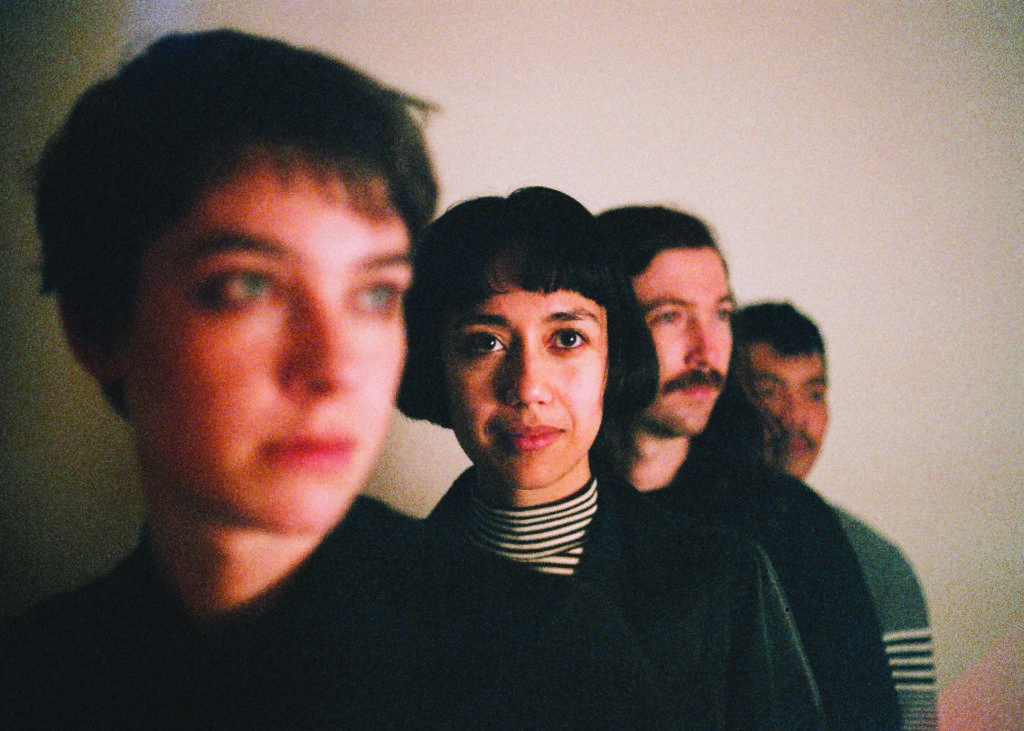
When she wrote the album, Heynderickx didn’t have a garden, let alone a home that could support one. Nor was she taking very good care of herself, she admits. It was a darker time of life, she says, and she sat down to write the songs as “an act of therapy,” a way to exercise patience and kindness with herself.
“To be able to start a garden means you carve the time out of your life to take that meditation for yourself and to be with nature,” she says. “And I think that’s one of the hardest things to do is just say no to a couple things. Work a little less, be kind to yourself. These are not natural things in the Western world on our autopilots anymore.”
Heynderickx never thought she’d be a full-time musician. It’s not that she didn’t want to — she even learned a classical guitar audition piece to study music in college but never went to the audition — it’s just that no one ever “said it was a good idea,” she says.
Her career is somewhat of a happenstance, birthed, in part, by the kindness of friends who invited her to open for them at bars during “small mental break downs” in college, she says, despite the fact that she was underage.
“I just finally felt joy for the first time as an adult through music,” she says.
She first started singing at the age of four, bribed by her mom with Kraft singles to perform karaoke at Filipino parties. Her mom, she explains, is a rambunctious Fillipina, which contrasts the quieter, introverted Heynderickx, who enjoys silence and solitude, especially while writing music.
“To be able to create and feel at peace and to feel like I can talk with my creative, I have to be very alone,” she says. But then, she takes the songs on the road, singing them in front of hundreds of people each night, talking to dozens of fans about them afterwards, rarely finding a moment to herself.
It’s an odd contradiction to live she says, but we all live a life of paradoxes. We all know we’re going to die, yet try to make each day in this life meaningful. She wishes she didn’t have to charge for shows, that her art could be free, but charging for shows has given her the most financial stability she’s ever experienced. The irony in her first album is that its success has given her the space and time to actually start a garden.
“The paradoxes makes me laugh at the tension that’s all around us,” she says. “And I think the tension is what creates a lot of the beautiful art around the world.”
She recently witnessed a hummingbird tuck its beak in too-tiny a flower, causing it to break off the stem and sit on the bird like a top hat. As she watched it float around the yard in panic, Heynderickx began writing a “really dumb song,” she says.
It may become her next hit, or it may never see the light of day, reserved for herself and unshared with the rest of the world.
“Sometimes it feels good to just write for yourself and you know when songs are just for you,” she says. “And you know when songs could be a ripple effect for other people and those are the ones you want to share.”
Haley Heynderickx, Saturday, Aug. 17, 3:30 p.m. Heynderickx will also be an instructor at the Song School Aug. 11-15.
Ben Folds
by Angela K. Evans
At its most basic, making art is about following what’s luminous to you and putting it in a jar, to share with others,” writes Ben Folds in his new, and first, book: A Dream about Lightning Bugs: A Life of Music and Cheap Lessons.
And art, Folds maintains, is worth fighting for.
The last time I saw Folds live, he performed with the Colorado Symphony Orchestra on Nov. 12, 2016, just days after Donald Trump’s election. Performing his Concerto for Piano and Orchestra, Folds didn’t sing any of the rock songs that made him famous as part of the trio Ben Folds Five. Nor did he play any of his numerous solo works, most of which showcase his iconic storytelling talk-sing style. But his dynamism still shone as he sat at the grand piano center stage, his fingers bouncing over the keys with force.
After the standing ovation, acknowledgment of the conductor and multiple bows (standard in any symphony performance) Folds grabbed the mic to speak. He made an impassioned plea urging the audience to continue supporting the symphony and all of the arts amid rumors of drastic funding cuts to the National Endowment for the Arts.
I can’t remember exactly what he said, but what I do remember is the way the bearded rock singer from North Carolina engaged the diverse audience — everyone from seasoned symphony ticket holders dressed to the nines to jean-clad Gen Xers and millennials lifting up their drinks in agreement.
This is a guy who can speak the language of the people, who can make us laugh and think all in a matter of seconds.
Folds’ career has been anything but conventional over the last two and a half decades or so. He’s following a winding path of writing, recording and touring both with Ben Folds Five and on his own, interspersed with collaborative projects as varied as writing the arrangements for William Shatner’s Has Been, or music for lyrics written by book authors like Nick Hornsby and Neil Gaiman. His last release was 2015’s So There, a collection of chamber pop ballads with the yMusic ensemble and a piano concerto performed with the Nashville Symphony.
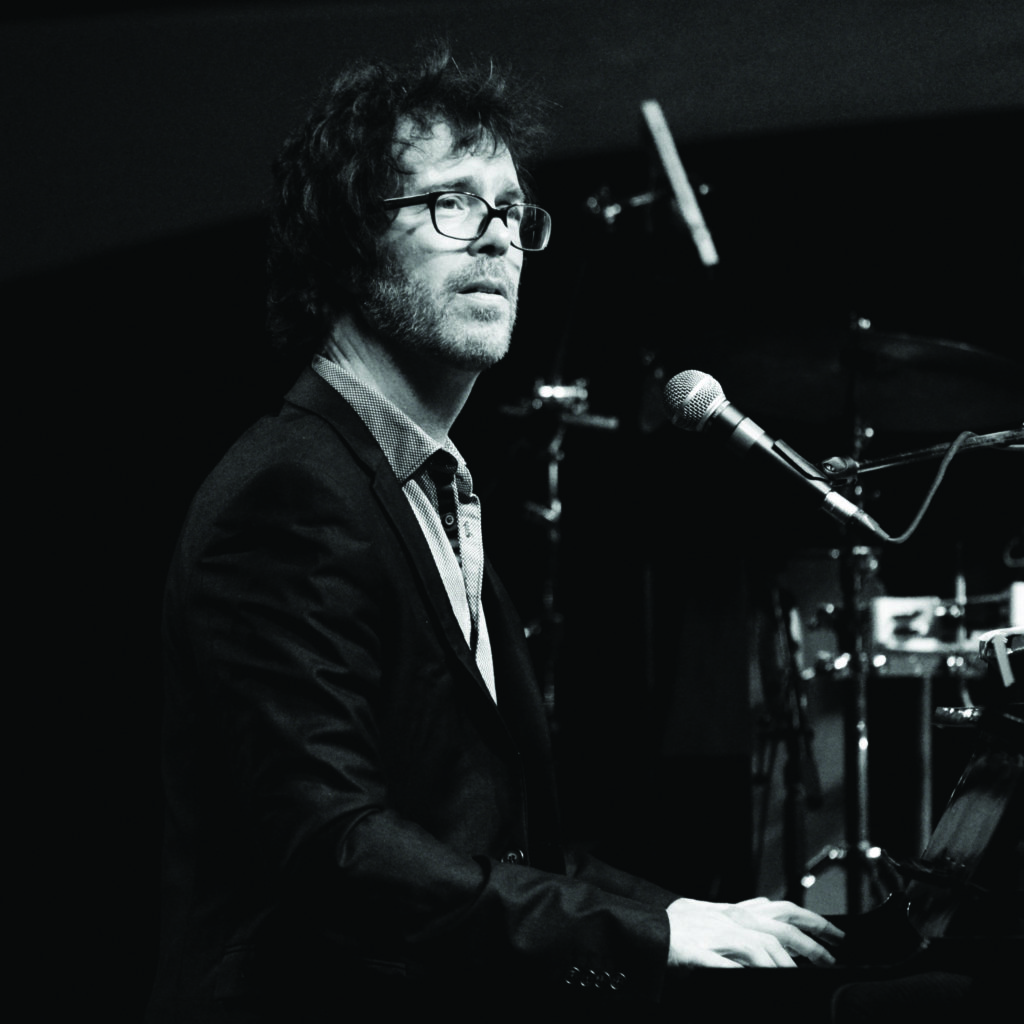
All along the way, Folds has continued to tour, playing all of his hits as well as often improvising songs on stage. Recently, he made headlines by performing a mostly instrumental piece aimed at the Speaker of the House Mitch McConnell in New York. Entitled “Moskow Mitch,” he sang the tagline and trending Twitter topic due to McConnell’s blocking of election security bills, with a stutter in the style of “My Sharona.”
But Folds doesn’t just make impassioned speeches or sing about politics. He’s committed to seeing funding for the arts, arts education and music therapy continue and advocates through his work with the Americans for the Arts Action Fund. He’s also hosting a podcast, ArtsVote 2020 with a quest to interview every Democratic presidential nominee about how arts and arts education have personally influenced them, and seeking to understand their vision for advancing the arts in the future. While he has acknowledged this may not be the most pressing issue of the day, or a topic that will make its way to the debate stage, Folds is committed to keeping the arts a part of our everyday life.
As he said in a press release announcing the podcast, “The more work I do as an arts advocate, the more convinced I am of the importance of investing in the arts, not only for its obvious cultural benefits, but for the positive measurable impact it has on our economy and on how our children learn in school, as well as the health and well-being of all those who come into contact with the arts.”
Ben Folds, Saturday, Aug. 17, 9 p.m.
Dr. Ysaÿe Barnwell and The War and Treaty
by John Lehndorff
It can be confusing for former Christians — your card-carrying liberal agnostics — when they have to admit that they really miss gospel music. They secretly love singing in the congregation, the power of the choirs, hymns and chants. They feel a little sheepish when they get misty-eyed during gospel songs at bluegrass festivals. Secretly, they know all the words.
These folks miss the feeling and the healing, not necessarily the sin and religion, and now there is solid science showing why. Research indicates that singing in groups triggers the release of serotonin and oxytocin, the bonding hormone. Communal singing can even synchronize heart beats. It makes participants feel better, especially when they are singing about good news, which is literally what “gospel” means.
That deep feeling will be shared on Sunday, Aug. 18 at the Folks Festival in two very different guises: One quieter and brainier, one loud, emotional and raw, and both deeply soulful. Both Dr. Ysaÿe Barnwell and the remarkable couple that forms The War and Treaty manage to lift willing hearts of all spiritual persuasions.
The day starts with a folk music icon who last graced the stage eight years ago with the African American a cappella ensemble she helped found, Sweet Honey in the Rock. Attendees need to come ready to sing, even if they think they have terrible voices and it’s too early in the a.m. to think, never mind harmonize.
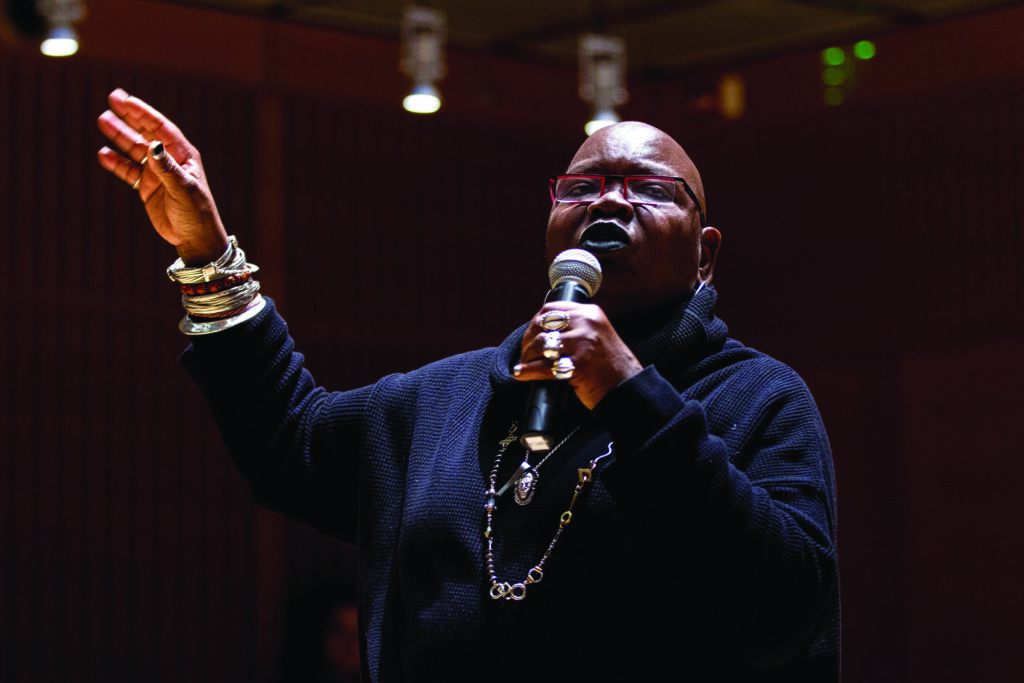
Barnwell is a professor, author and composer/arranger, but her greatest gift may be in building vocal communities. She leads workshops that get people in touch with their own voices by singing together. Barnwell teaches what she calls “sacred songs,” the African American spirituals, uplifting hymns and songs from the Civil Rights era. She has a preacher’s zeal for inducing reluctant singers to harmonize and feel that rush. But it is notably spiritual, not dogmatic.
A different sort of catharsis — the good news of love — takes over the festival in the evening. The War and Treaty is not a sit-on-the-tarp-and-politely-clap acoustic act. It’s a full blast, stand up, sweat, moan and smile kind of electric band.
Fronted by Michael and Tanya Trotter, who met in Afghanistan, The War and Treaty stew somewhere in the midst of soul, gospel and Americana. “It’s our duty to give everything we have every night when we walk on stage,” Michael Trotter says. They face the audience with larger-than-life emotional vulnerability, leaving the audience spent and experiencing a transcendent communal hug.
The duo’s debut album, Healing Tide, produced by Nashville’s Buddy Miller, includes guests like Emmylou Harris. It’s packed with rousing, direct anthems including “Love Like There’s No Tomorrow” and “Are You Ready to Love Me?” They are evangelists of affection.
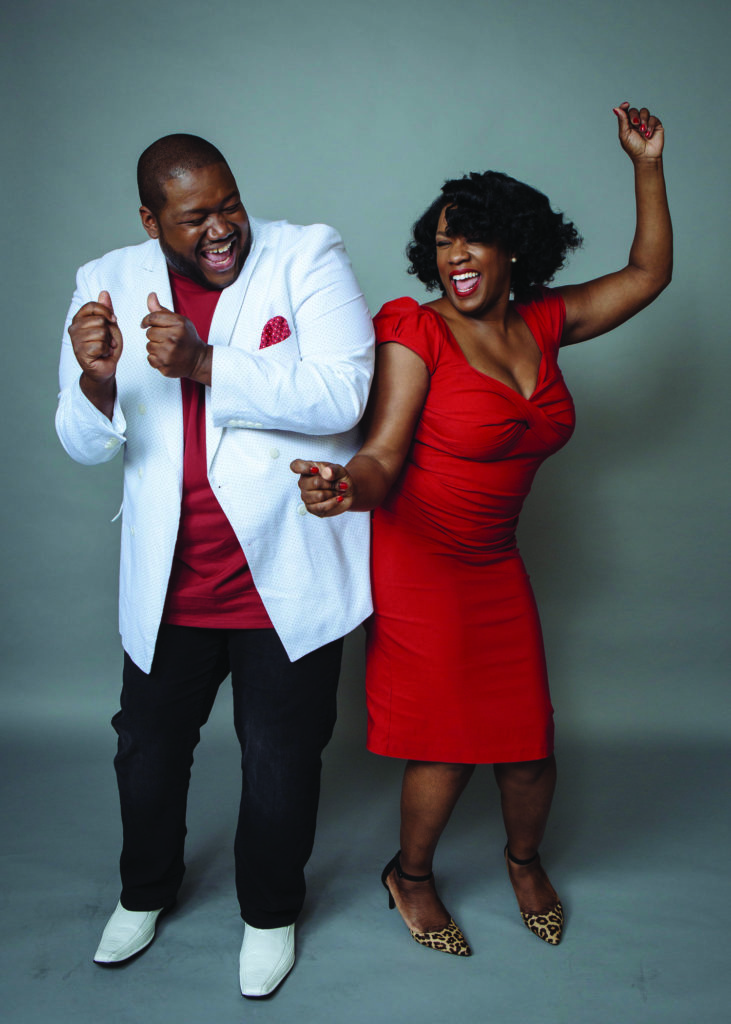
The War and Treaty’s “Down to the River” will likely send festival-goers to baptize themselves in the cold rushing creek running alongside the site. The Trotters’ sets are less concerts than tent revival meetings — but without the hell fire and damnation.
“There is a misconception that gospel means shouting and screaming and moaning. It belongs to the spirit. Religion is something that man created,” Trotter says.
“We suspend the ideology and extend an invitation to the spirit. That’s what I love, when everybody feels like they’ve had church without feeling bad,” he says.
It harkens back to Trotter’s childhood. “I just remember as a child watching my mother sing in church and seeing people’s reaction to the music — the tears and the joy. I learned that music has an emotional place in our lives. I think that music speaks to a part of us as humans that is not being touched very much anymore,” he says.
The band’s inspirations are wide-ranging. “My musical heroes include Nina Simone and Al Green. Pete Seeger is definitely one. Of course, Sweet Honey in the Rock and my favorite artist of all time, Mr. Ray Charles. I love the spirituality of Aretha and Johnny Cash’s story,” he says.
The War and Treaty arrived at its band name during a heated marital disagreement. “We’re passionate people. Tanya and I were arguing about me changing the name of the band again. She said, ‘Calm down, this is not a war and we’re not here to sign a peace treaty.’ I said, ‘That’s the name.’ She liked it, too,” he says.
Michael Trotter says it’s time for the next generation to testify about hope. “It’s our turn to figure out how to fight hate and build love. I love Nat King Cole because he always fought it with joy, with a smile,” Trotter says, adding that he is not discouraged by the daily horror on the news.
“I am absolutely hopeful that things can change for the better,” he says.
Likewise, Barnwell boils it down to four guiding principles in her biography.
• To whom much is given, much is required.
• As one door closes, another door opens.
• Everything matters.
• Say Yes!
Ysaÿe Barnwell: Sacred Songs. Sunday, Aug. 18, 11 a.m. The War and Treaty. Sunday, Aug. 18, 5 p.m.














